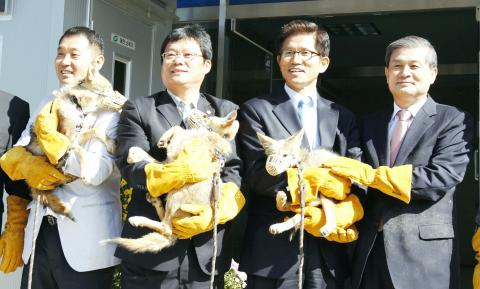Disgraced South Korean stem cell scientist Hwang Woo-suk yesterday unveiled eight cloned coyotes in a project sponsored by a provincial government.
Hwang delivered the clones to a wild animal shelter at Pyeongtaek, 50km south of Seoul, in a ceremony chaired by Gyeonggi Provincial Governor Kim Moon-soo, Kim’s office said.
Hwang was a national hero until some of his research into creating human stem cells from a cloned embryo was found to be faked.

Photo: Reuters
However, his work in creating Snuppy, the world’s first cloned dog, in 2005 has been verified by experts and authorities.
Under a joint project with the province to clone wild animals, Hwang took cells from the skin of a coyote, Kim’s office said in a statement. He transplanted their nuclei into a dog’s eggs from which the canine nucleus had been removed, it said, adding the first clone was born on June 17.
In a Twitter message, the governor praised Hwang for what he called the world’s first use of such a technique.
“The cloning of an African wild dog is under way, and we will attempt to clone a mammoth in the future,” Kim said.
South Korean experts have previously cloned animals, including a cow, a cat, dogs, a pig and a wolf. The cloned wolf died in 2009.
Hwang shot to fame in 2004 when he published a paper in the US journal Science claiming to have created the world’s first stem-cell line from a cloned human embryo.
However, his reputation was tarnished in November 2005 by allegations that he had violated medical ethics by accepting human eggs from his own researchers.
In January 2006 an investigative team ruled that his findings were faked and said he had produced no stem cells of any kind.
In 2009 Hwang received a two-year suspended sentence for embezzling research funds and ethical lapses in obtaining human eggs. In December last year, an appeals court reduced the penalty to an 18-month suspended sentence.

POLITICAL PRISONERS VS DEPORTEES: Venezuela’s prosecutor’s office slammed the call by El Salvador’s leader, accusing him of crimes against humanity Salvadoran President Nayib Bukele on Sunday proposed carrying out a prisoner swap with Venezuela, suggesting he would exchange Venezuelan deportees from the US his government has kept imprisoned for what he called “political prisoners” in Venezuela. In a post on X, directed at Venezuelan President Nicolas Maduro, Bukele listed off a number of family members of high-level opposition figures in Venezuela, journalists and activists detained during the South American government’s electoral crackdown last year. “The only reason they are imprisoned is for having opposed you and your electoral fraud,” he wrote to Maduro. “However, I want to propose a humanitarian agreement that

ECONOMIC WORRIES: The ruling PAP faces voters amid concerns that the city-state faces the possibility of a recession and job losses amid Washington’s tariffs Singapore yesterday finalized contestants for its general election on Saturday next week, with the ruling People’s Action Party (PAP) fielding 32 new candidates in the biggest refresh of the party that has ruled the city-state since independence in 1965. The move follows a pledge by Singaporean Prime Minister Lawrence Wong (黃循財), who took office last year and assumed the PAP leadership, to “bring in new blood, new ideas and new energy” to steer the country of 6 million people. His latest shake-up beats that of predecessors Lee Hsien Loong (李顯龍) and Goh Chok Tong (吳作棟), who replaced 24 and 11 politicians respectively

Archeologists in Peru on Thursday said they found the 5,000-year-old remains of a noblewoman at the sacred city of Caral, revealing the important role played by women in the oldest center of civilization in the Americas. “What has been discovered corresponds to a woman who apparently had elevated status, an elite woman,” archeologist David Palomino said. The mummy was found in Aspero, a sacred site within the city of Caral that was a garbage dump for more than 30 years until becoming an archeological site in the 1990s. Palomino said the carefully preserved remains, dating to 3,000BC, contained skin, part of the

Russian hackers last year targeted a Dutch public facility in the first such an attack on the lowlands country’s infrastructure, its military intelligence services said on Monday. The Netherlands remained an “interesting target country” for Moscow due to its ongoing support for Ukraine, its Hague-based international organizations, high-tech industries and harbors such as Rotterdam, the Dutch Military Intelligence and Security Service (MIVD) said in its yearly report. Last year, the MIVD “saw a Russian hacker group carry out a cyberattack against the digital control system of a public facility in the Netherlands,” MIVD Director Vice Admiral Peter Reesink said in the 52-page